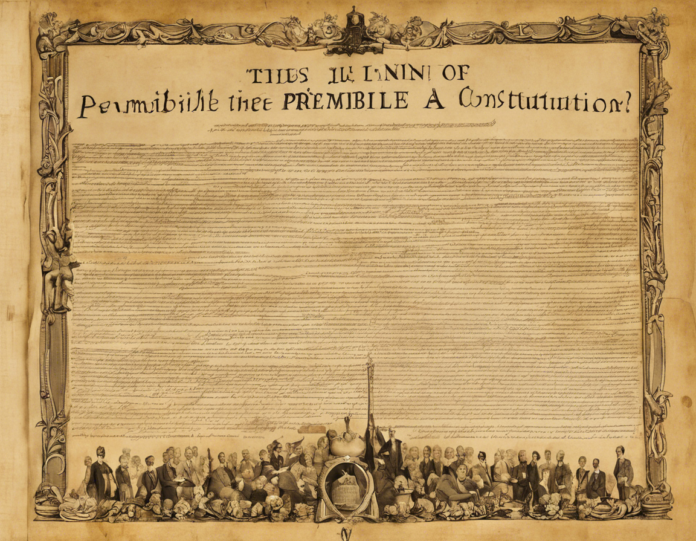In the realm of constitutional law, the preamble stands as a foundational yet often overlooked component of a constitution. Positioned at the beginning of a constitution, the preamble typically serves as an introductory statement that outlines the core values, principles, and goals that the constitution aims to uphold. While some may view the preamble as mere symbolism, it actually plays a crucial role in the interpretation and understanding of the constitution as a whole.
Understanding the Significance of Preambles
Historical Context
Preambles have a rich history dating back to the earliest known constitutions. The preamble of the United States Constitution, for example, is a famous and influential proclamation that sets forth the guiding purposes of the document.
Expressing National Identity
One of the primary functions of a preamble is to express the national identity of a country. By articulating the fundamental values and aspirations of a society, the preamble serves as a touchstone for interpreting the constitution and understanding the underlying philosophy of the legal system.
Interpreting Constitutional Provisions
Legal scholars and courts often look to the preamble when interpreting ambiguous constitutional provisions. The values and principles enshrined in the preamble can provide valuable insights into the intent of the framers and the overarching goals of the constitution.
Key Elements of a Preamble
Declaration of Purpose
Most preambles begin with a declaration of purpose, stating the reasons for the enactment of the constitution and the goals it seeks to achieve. This section often includes phrases such as “We, the people,” emphasizing the democratic foundation of the constitution.
Principles and Values
Preambles often enumerate the fundamental principles and values that the constitution is designed to uphold. These may include ideals such as justice, liberty, equality, and democracy, among others. By highlighting these principles, the preamble sets the tone for the entire legal framework.
Historical Context
Many preambles also provide a brief historical context, outlining the events or circumstances that led to the drafting and adoption of the constitution. This historical background can shed light on the challenges and aspirations of the framers.
Role of Preambles in Different Legal Systems
Common Law Countries
In common law countries such as the United States and the United Kingdom, preambles are considered integral parts of the constitution and are often cited in legal arguments and judgments.
Civil Law Countries
In civil law countries like France and Germany, preambles may not have the same legal significance as in common law jurisdictions. However, they still serve as important expressions of national identity and values.
Interpreting Preambles in Constitutional Law
Use in Judicial Interpretation
Courts often refer to the preamble when interpreting constitutional provisions or resolving disputes. The values and principles articulated in the preamble can guide judges in applying the law to specific cases.
Incorporation of International Law
Some constitutions incorporate principles of international law in their preambles, signaling a commitment to upholding universal norms and standards. This can have implications for the interpretation of domestic laws in line with international obligations.
Conclusion
In conclusion, the preamble of a constitution serves as a foundational statement of purpose and values that underpin the legal system. While not legally binding in the same way as other constitutional provisions, preambles play a vital role in interpreting the constitution, understanding the intent of the framers, and expressing the national identity of a country. By distilling the core principles and aspirations of a society, preambles are essential guides that shape the interpretation and application of constitutional law.
Frequently Asked Questions (FAQs)
1. What is the difference between a preamble and other parts of the constitution?
The preamble sets forth the foundational values and goals of the constitution, while other parts, such as articles and amendments, outline specific rights, powers, and structures within the legal framework.
2. Can the preamble be amended?
In some countries, the preamble can be amended through the same procedures as other parts of the constitution. However, in practice, preambles are often left unchanged to preserve the original intent and spirit of the constitution.
3. How does the preamble influence judicial decision-making?
Courts may consider the values and principles expressed in the preamble when interpreting constitutional provisions or resolving disputes. The preamble can provide guidance on the intent of the framers and the overarching goals of the legal system.
4. Are all preambles of constitutions the same?
No, preambles vary widely in content and structure depending on the historical, cultural, and political context of each country. Some preambles are more detailed and expansive, while others are succinct and focused on core principles.
5. Can the preamble be used to invalidate unconstitutional laws?
While the preamble itself may not have the legal force to invalidate laws, courts may consider the values and principles articulated in the preamble when assessing the constitutionality of legislation. The preamble can serve as a persuasive argument in constitutional interpretation.









